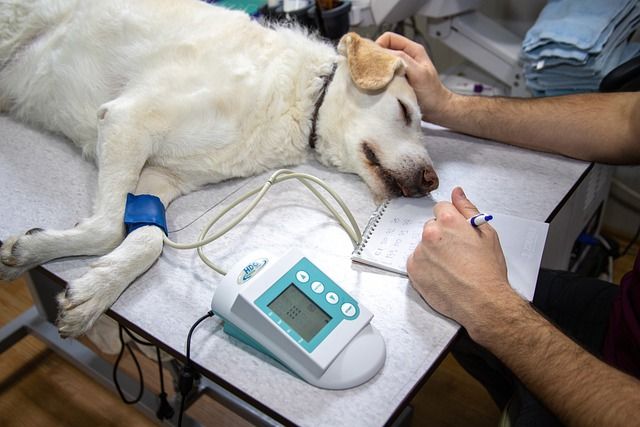
Given today’s busy lifestyle, it’s no surprise that heart diseases such as ischemia, cardiopathies, cardiac arrhythmias and coronary diseases are the leading cause of death, with ischemic heart disease topping the list, according to statistics and studies by the WHO (World Health Organization).
It’s also not uncommon for our pets, who share similar lifestyles with us, to develop similar diseases, and it’s interesting to note that heart diseases in dogs and humans share some similarities, but with distinct differences.
Let me explain: many heart problems stem from poor quality of life, including lack of exercise, sedentary habits and a suboptimal diet.
That is the similarity between humans and dogs and mammals in general: if they eat moderately and engage in more exercise, they will improve their health, thus enhancing their quality of life. What sets them apart is their diet. In both cases, it is poor; dogs are fed excessive carbohydrates from commercial pet foods such as kibble, while, despite not being carnivores like dogs, humans consume an excessive amount of animal protein.
Dogs require a diet rich in medium to high-quality animal proteins and fats, in contrast to humans.
Let’s focus on dogs. The majority of our canine companions are fed kibble, and most of these products are mediocre to poor, containing an excess of cereals that dogs don’t need because their physiology, metabolism, and other characteristics are those of carnivores.
If we add a sedentary lifestyle to this, we have a recipe for disaster.
Why is a diet rich in animal proteins important to prevent heart problems in our dogs?
Aside from genetic factors (breed predisposition) and other conditions beyond our control, the diet is something that we can influence.
Is there any doubt that eating properly increases the chances of better health? None.
The same applies to dogs; if we provide them with a diet tailored to their needs, the likelihood of diseases, including heart issues, is dramatically reduced.
And most importantly, animal proteins are rich in taurine and carnitine, two essential amino acids for good heart health – I’ll talk about them shortly.
Animal proteins, such as those found in various meats such as fish, chicken and beef, are rich in taurine, a crucial amino acid for heart health.
Cases of dilated cardiomyopathy and taurine deficiency were well-known and common decades ago when pet food companies, in their constant quest to reduce costs, provided so little animal protein in their diets. Low-quality commercial foods contain an excess of cereals and are low in animal protein because weight for weight, cereal is much cheaper than animal protein found in fish, chicken and beef. As a result, this led to a proliferation of cardiac problems in dogs.
The Importance of Orthomolecular Nutrients in Heart Health
Another essential component in heart health and nutrition is carnitine. As its name implies, this amino acid is abundant in all muscles, hence the Latin prefix “carni.”
Carnitine helps transport fat into the cell, providing it with energy and aiding in its proper metabolism and burning. That’s why carnitine is crucial in reducing weight in obese dogs.
Orthomolecular nutrients like hawthorn flowers, leaves, and fruits have proven effective for dogs with heart failure, in addition to Gingko and carnitine itself.
There’s a product called “Herz Vital” (Heart Vital) exclusively designed for dogs and cats, which has my approval due to its origin from a reputable German laboratory, Anibio, in which I place great trust and faith in their products.
Hypertension, Sodium, Potassium, Magnesium, and Heart Disease
We will address each of these individually, but in summary, managing hypertension is the key to heart health.
The heart is basically a fluid pump, which, if subjected to pressure, it’s going to force it, which directly affects its function.
And what does this have to do with nutrition?
Well, quite a lot, because the diet we consume directly influences blood pressure. Foods rich in sodium raise blood pressure, and as we know, high blood pressure is harmful for dogs (and humans) with kidney disease.
The Importance of Homemade Diets for Dogs with Heart Disease
Although there are prescription diets made by various pet food companies for dogs, we know that the nutrients will never match the quality of fresh food we buy and prepare ourselves.
The key is to have professional guidance to create a proper diet with all the necessary nutrients for dogs with cardiac issues.
We also know that industrial processes that use high temperatures and pressures destroy many of the nutrients. Consequently, another advantage of a well-made homemade diet for a dog with heart disease is the higher quality of minimally processed nutrients since they will have been subjected to minimal heat.
In conclusion, diets for dogs with heart disease should be based on animal proteins due to the beneficial components they contain.
However, we must also maintain mineral balance, avoiding calcium deficiencies and excessive sodium.
Click here and fill out the questionnaire if you want to start working together with us.
Best regards.
